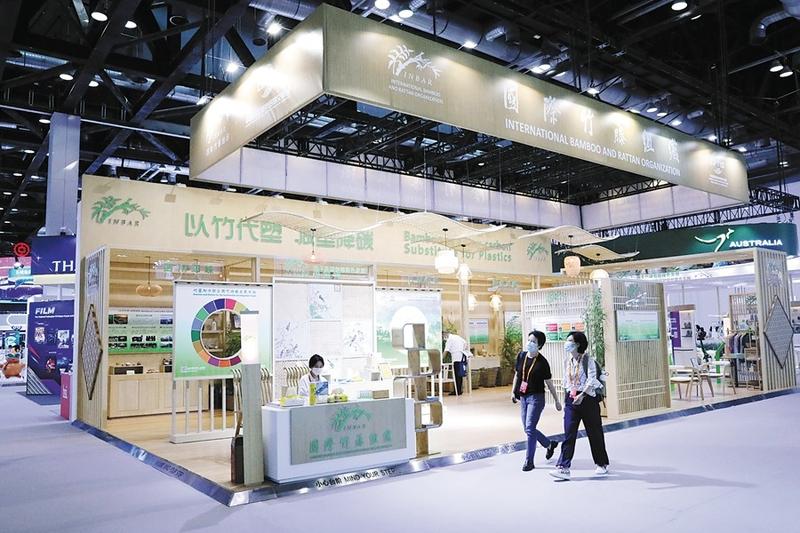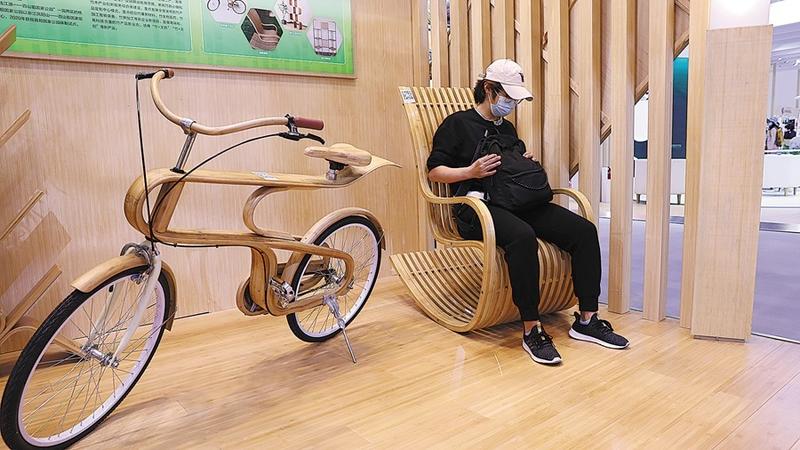 Visitors walk past the booth of the International Bamboo and Rattan Organization, or Inbar, an intergovernmental organization promoting sustainable development, at the 2022 China International Fair for Trade in Services in Beijing in September. (PHOTO PROVIDED TO CHINA DAILY)
Visitors walk past the booth of the International Bamboo and Rattan Organization, or Inbar, an intergovernmental organization promoting sustainable development, at the 2022 China International Fair for Trade in Services in Beijing in September. (PHOTO PROVIDED TO CHINA DAILY)
'Low-carbon' is new buzzword as sustainable biz turns effective
Low-carbon consumption — that's the new buzzword among China's energy industry cognoscenti, thanks to the country's twin goals of peaking carbon emissions by 2030 and achieving carbon neutrality by 2060.
The buzz phrase cropped up again and again at the 2022 China International Fair for Trade in Services, or CIFTIS, held in Beijing in September, as hundreds of thousands of visitors realized the benefits of bamboo-made disposable tableware, neon signs that glow without being plugged in, and hydrogen fuel cells that drain only water, which were all on display.
Bamboo, the crowd realized, can not only serve as a meal for pandas or as raw material in the making of furniture but also be transformed into a whole set of tableware, including knives and forks, spoons, straws, cups and even napkins
Bamboo, the crowd realized, can not only serve as a meal for pandas or as raw material in the making of furniture but also be transformed into a whole set of tableware, including knives and forks, spoons, straws, cups and even napkins.
READ MORE: Sci-tech progress helps China cut carbon emission
Fu Jinhe, director of Host Country Affairs of the International Bamboo and Rattan Organization, or Inbar, an intergovernmental development organization that promotes environmentally sustainable development using bamboo and rattan, said: "Bamboo is a green, low-carbon, fast-growing and degradable biomass material. It can replace plastics in many fields. Currently, there are over 10,000 types of bamboo products, covering the areas of basic necessities of life.
"We are witnessing growing demand for green consumption in China. This year, our booth at the CIFTIS grew to 120 square meters, double the size last year, as our business partners have been growing. It's expected that our booth area will continue to increase in the coming years."
Green consumption refers to purchase of products and services that are environmentally friendly by way of use of low-carbon practices in manufacturing, supply chain activities or related areas, often throughout the value chain.
During this year's China International Consumer Products Expo held in Haikou, Hainan province, "sustainability" and "low-carbon consumption" emerged as key themes. A cup of "zero-carbon" coffee, produced by a domestic coffee brand, hogged the limelight. The production process concerned was said to be carbon-neutral.
ALSO READ: China makes great strides on carbon goals
Wang Luyuan, founder of Peasup, a Chinese plant-based snacks maker, said more and more consumers are embracing the sustainable lifestyle concept in China these days.
The company, founded in 2019, is one of the early birds to sell its products in the plant-based food segment in China. Its aim is to lead the trend of plant-based diets among young people. For now, the startup offers chickpea-based snacks, soy milk and pasta products.
Wang said plant-based food production reduces carbon emissions. To get the same 50 grams of protein, the carbon footprint of beans is much lower than that of meat.
According to the guideline, by 2025, Shanghai's low-carbon industry will surpass 500 billion yuan in annual sales revenue, and the city will form a development pattern comprising two 100 billion yuan industrial clusters, five 10 billion yuan clusters and dozens of 1 billion yuan clusters
Peasup is also focusing on carbon reduction in the supply chain. "To avoid the large carbon footprint generated by shipping, we plan to localize the sourcing of all ingredients by June next year," said Wang.
The chickpeas used in Peasup's production have been so far imported from Turkey. But the proportion of locally sourced ingredients increased from 50 percent in 2020 to 70 percent in 2021.
READ MORE: Consumption, infrastructure get green tinge
Data from the company showed both retailers and consumers are embracing plant-based foods. Peasup netted more than 10 million yuan (US$1.38 million) in revenue in 2021. The company's products entered nearly 400 Freshippo stores nationwide in August. In the past, its products were sold mainly online or in a small number of offline stores.
"Entering the biggest new retailer in China on a large scale is a milestone event for plant-based food makers," said Wang.
According to a recent report from global accounting firm PwC, in many areas, including food, clothing, living, transportation and tourism, the green consumption style has found wide acceptance. The market volume of green consumption is rapidly growing, market observers said.
Cai Xiaoying, ESG managing partner of PwC China, said, "The consumption sector, as a fundamental propeller of economic development, is leading the industrial revolution toward a greener, more convenient and more innovative direction."
 A visitor tries out a rocking chair made of bamboo at Inbar's booth during this year's China International Fair for Trade in Services. Inbar sees growing demand for green consumption in China where green consumption demand is sought to be "stimulated and released". (PHOTO PROVIDED TO CHINA DAILY)
A visitor tries out a rocking chair made of bamboo at Inbar's booth during this year's China International Fair for Trade in Services. Inbar sees growing demand for green consumption in China where green consumption demand is sought to be "stimulated and released". (PHOTO PROVIDED TO CHINA DAILY)
On July 8, the Shanghai municipal government issued a guideline on promoting the development of the low-carbon industry. According to the guideline, by 2025, the city's low-carbon industry will surpass 500 billion yuan in annual sales revenue, and Shanghai will form a development pattern comprising two 100 billion yuan industrial clusters, five 10 billion yuan clusters and dozens of 1 billion yuan clusters.
ALSO READ: China 'key' to global green transition
Elsewhere, the National Development and Reform Commission, the Ministry of Industry and Information Technology and the Ministry of Commerce jointly launched an action plan to promote green consumption. The action plan instructed that by 2025, the green consumption concept should win popular support, and the market share of green consumer goods should surge. By 2030, green consumption should be the public's natural choice, and green products should become the mainstream in the market, the action plan stated.
Chang Tiewei, deputy director of the Department of Employment, Income Distribution and Consumption at the NDRC, said: "The green consumption concept has been gradually popularized in recent years. However, wasteful and unreasonable consumption phenomena still exist in some sectors, and green consumption demand needs to be stimulated and released."
The action plan suggested the building of a resource-saving society that avoids luxury consumption and excessive consumption. The government should expand green, low-carbon product supply, improve the institutional system, promote the structural transformation of green consumption, and accelerate the formation of a moderate, low-carbon and healthy consumption mode.
A report on green consumption released by China's e-commerce platform JD showed that in 2021, 93 percent of the surveyed consumers paid attention to a healthy lifestyle, among which the number of consumers born in or after 1990 surged by 134 percent year-on-year.
READ MORE: China committed to carbon goals despite global volatility
A report on green consumption released by China's e-commerce platform JD showed that in 2021, 93 percent of the surveyed consumers paid attention to a healthy lifestyle, among which the number of consumers born in or after 1990 surged by 134 percent year-on-year
"Sustainability has become a new communication context between consumers and society," said the report.
Chen Jia, an independent researcher in international strategy, said: "Boosting green consumption is the route the country must take to implement green economic development strategies. Low-carbon, green consumption is also an inevitable trend for global consumption transformation. Against a backdrop of China's consumption upgrade, enterprises should explore new business growth points."
Some companies are already grasping such business opportunities brought by green consumption. For instance, JD launched a green consumption festival in May, promoting green, organic foods, including organic milk, plant-based food and vegetable-based diet.
In August, it hosted an environmental protection-themed art exhibition called "Make Sustainability Visible". The exhibition attracted a lot of visitors and raised people's awareness of green consumption.
In terms of packaging, beverage brands such as Master Kong, Coca-Cola and Nestle all launched bottles without plastic labels. Shanghai-based Bright Dairy & Food Co has set every 5th, 15th and 25th of a month as the "milk carton recycling days". During the recycling days, residents only need to collect 10 milk cartons from any brand and of any size, and exchange them for free products from the company, including edible oil, and agricultural and miscellaneous products. Coffee brands such as Starbucks, Manner, Pacific Coffee, Tim Hortons and McDonald's are offering discounts when consumers bring their own coffee cups.
ALSO READ: US, China urged to team up on emissions
On the production side, numerous consumer brands are actively exploring "carbon-neutral factories" and a low-carbon, sustainable business model. South Korean confectioner Orion Food Co Ltd has established a global carbon emission management system. The distributed photovoltaic power generation equipment at Orion factories in Guangzhou, Guangdong province, and Shanghai were put into operation this year. Domestic companies, such as sugar-free sparkling drink brand Yuanqi Senlin and dairy giant Yili Group, have also built renewable energy-powered carbon-neutral factories.
Liu Hui, associate professor at the University of Chinese Academy of Social Sciences, said: "Embracing green consumption is an upgrade and transformation for consumer brands. The Asia-Pacific region is one of the regions with the highest food waste in the world, accounting for over half of the global food waste. Therefore, low-carbon, green consumption that reduces waste contains a pot of gold."
Researcher Chen said: "Enterprises should actively adjust their products and services, to better suit the online consumption trend and the environmental protection concept. On the one hand, they should reduce costs and increase efficiency, and raise their own competitiveness to withstand risks; on the other hand, based on consumer demand, they should accelerate innovation, using new products and new services to deal with opportunities and challenges brought by the consumption transformation.
"As a whole, the green consumption sector is highly innovative and adaptive, and contains strong 'Created in China' characteristics. The future is quite promising."
He Jingwei contributed to this story.
zhengyiran@chinadaily.com.cn


